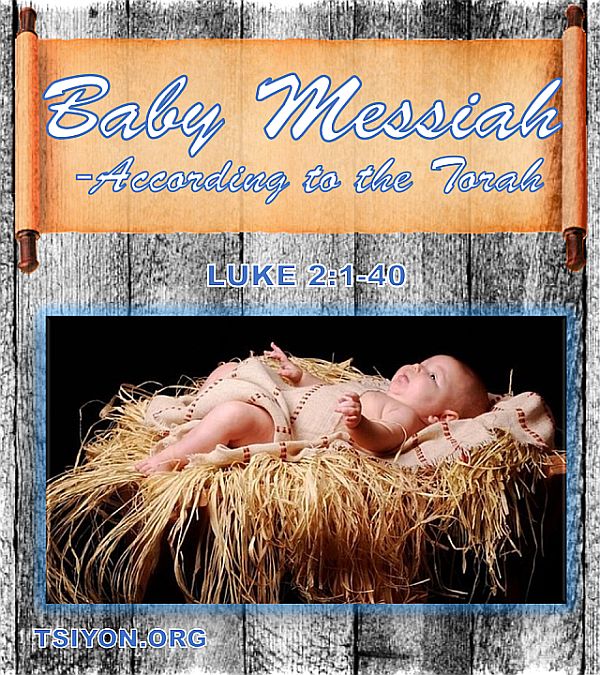****************************************
From Eliyahu
 A lot of people have precious memories of Christmas - but does that make
Christmas a good thing? Imagine calling the birth of a Jewish baby boy "the
Christmas Story." Really, its more about satan...errrr, I mean santa, and
all of the rest of the "Christmas" customs (borrowed from the pagans) than
anything having to do with the birth of the Messiah.
A lot of people have precious memories of Christmas - but does that make
Christmas a good thing? Imagine calling the birth of a Jewish baby boy "the
Christmas Story." Really, its more about satan...errrr, I mean santa, and
all of the rest of the "Christmas" customs (borrowed from the pagans) than
anything having to do with the birth of the Messiah.
That's quite a mindbender for traditional Jewish people. Is it any wonder that so many of them cannot imagine the baby who is the centerpiece of pagan-based beliefs and customs as the Messiah of Israel?
This disconnect in the Christian world from the Jewishness of "Jesus" (a Greek name - His real Hebrew name is Yeshua) has not served the Great Commission very well. This reminds me of the words of the Apostle Paul:
"...there isn’t another “good news.” Only there are some who trouble you, and want to pervert the Good News of Messiah. But even though we, or an angel from heaven, should proclaim to you any “good news” other than that which we preached to you, let him be cursed." Galatians 1:7-8
Is that too harsh? Is the traditional Christian "Jesus" a "perversion" of reality?
 Well,
look at this typical Christian illustration of the "Christmas Story."
Well,
look at this typical Christian illustration of the "Christmas Story."
 Notice
the halo around the head of "baby Jesus," Joseph and Mary. As you probably
know already, this halo or "nimbus" is very prevalent in Christian art. Do
you think there is anything in Scripture about Jesus, Joseph and Mary having
glowing heads at Jesus' birth? I didn't think so.
Notice
the halo around the head of "baby Jesus," Joseph and Mary. As you probably
know already, this halo or "nimbus" is very prevalent in Christian art. Do
you think there is anything in Scripture about Jesus, Joseph and Mary having
glowing heads at Jesus' birth? I didn't think so.
Consider this other picture of a floor mosaic from the 2nd century. Some might assume this is a picture of "Jesus" - but no, it is a picture of the sun god, Apollo. Depicting "Jesus" as the sun god certainly does confuse the story, so that it appears much more like Roman mythology than like the birth of the Jewish Messiah. Is this a "perversion" of the Good News? "Perversion" is defined as "the alteration of something from its original course, meaning, or state to a distortion or corruption of what was first intended." Yes, this meets the definition of "perversion." No joke, there is a curse connected with that!
While we are talking about Paul's words, Paul mentioned "angels from heaven" - are the childlike "angels" in this Christmas picture consistent with actual Biblical angels, who have the appearance of mighty men in Scripture? Clearly, no. These are the baby-like Cupid "Cherubs" of Greek mythology. These are the cute baby angels with chubby cheeks and little wings who use bows and arrows to cause people to fall in love. Known as either cherubs or cupids, these characters are popular in art - but not in reality.
 These
mythical cherubs probably made their way into Christian mythology because
Cupid is the god of love in ancient Roman mythology (same as Eros in Greek
mythology) - and you want love as part of the Christmas Story, right?
....Good grief!
These
mythical cherubs probably made their way into Christian mythology because
Cupid is the god of love in ancient Roman mythology (same as Eros in Greek
mythology) - and you want love as part of the Christmas Story, right?
....Good grief!
Cupid was the son of Venus, the Roman goddess of love, and was often depicted in art as a young man with a bow, ready to shoot arrows at people to cause them to fall in love with others. As the child of Venus, he was eventually depicted as baby cupid.
These cute little "cherubs" are actually nothing like the Biblical angels with the similar name: cherubim. Just as falling in love can be confusing, so is the history of how cupids came to be confused with Biblical angels. However it happened, it is very evident that from the 2nd century forward, the Good News was significantly corrupted with pagan symbolism, pagan form, and pagan ideology. In any event, all of this is pagan mythology and has nothing to do with the true account of the birth of Messiah found in Luke 2, in the Scriptures.
We could go on and on with examples of paganism corrupting the Good News. The truth is, Christianity as we know it has departed far from the actual Good News, as found in Scripture. Rather than lifting up the amazing birth of the Son of God as one of us, these perversions obscure the credibility of the actual Biblical narrative, making the real account of the historical Jewish Messiah appear no more real than the pagan myths of Cupid and Apollo.
So what really happened when Messiah was born? Luke chapter 2 gives us that information, and I can assure you, there are no pagan trappings anywhere to be seen in the actual account. It is Jewish from beginning to end, all according to the Torah.
Join us at our online Tsiyon meeting, at 8 PM CST at Tsiyon.Net. See the most amazing miracle that ever happened as it really happened - and be set free by the truth!
Shalom,
Eliyahu ben
David
Tsiyon.Org
****************************************
Study: One-fifth of Jewish millennials believe Jesus is the son of God
Reprint: Jerusalem Post, 11/01/2017
The survey, which was published this week, is mostly composed of the standard questions.
 The study surveyed 599 Jews born from 1984 to 1999. The
survey creates a contradictory portrait of Jewish millennials: These young
adults describe themselves as religious, and practice Jewish ritual, but are
unaffiliated. They value tradition and family, but don’t plan on marrying only
Jews. They are proud to be Jewish, but don’t feel that contradicts with
practicing other religions.
The study surveyed 599 Jews born from 1984 to 1999. The
survey creates a contradictory portrait of Jewish millennials: These young
adults describe themselves as religious, and practice Jewish ritual, but are
unaffiliated. They value tradition and family, but don’t plan on marrying only
Jews. They are proud to be Jewish, but don’t feel that contradicts with
practicing other religions.
It’s the kind of survey that could be useful to Jewish planners, if only for the
organization that commissioned and funded it: Jews for Jesus, the evangelical
group that for decades has been trying to draw Jews toward belief in Christ.
The survey was conducted by the Barna Group, a reputable polling firm
specializing in religion, especially conservative Christianity, and was sent to
the media with endorsements by Jewish studies professors. But its goal was to
conduct market research for “Messianic Jews.” And Jews for Jesus likes what it
sees.
“It was very hopeful from our perspective,” Susan Perlman, the San
Francisco-based group’s director of communications, told JTA. “This was a
generation that was spiritual, that is willing to engage in the subject of
whether or not Jesus might be the Messiah. All we can ask for is an open mind to
engage with the Bible, engage with the culture and look at the possibilities.”
The survey, which was published this week, is mostly composed of the standard
questions: how often do you pray, how do you feel about Israel, do you date
non-Jews and the like. Much of it is a millennial-focused version of the Pew
Research Center’s 2013 study of American Jews.
“They are free-thinking and flexible in their spiritual and religious identity,
yet they gravitate toward formal customs and ancient expressions of faith,” the
survey’s introduction reads. “Often molded by intermarriage and
multiculturalism, they reject rigid or traditional definitions of what it means
to be Jewish, but — more than any other generation — still consider their Jewish
identity to be very important to them.”
But it also includes a few unusual entries that Pew didn’t cover, like a
detailed section on belief in God and the afterlife, and — no surprise here — an
extensive examination of attitudes toward Jesus.
For those accustomed to thinking of millennials as religiously uninvolved and
skeptical of traditional practices, the survey has some surprising news: Eighty
percent of Jewish millennials self-identify as “religious Jews,” as opposed to
just a slim majority of all Jews. And nearly half say being Jewish is “very
important” to them, higher than any other generation.
That commitment to Judaism comes through in specific practices as well. Almost a
quarter of Jewish millennials attend religious services once a week, according
to the survey, and one in three prays every day. A majority says “God loves
people.”
Ari Kelman, a Jewish studies professor at Stanford University who was
interviewed as part of the report, said the study suggests a cohort distinct
from all others.
“These don’t look like Jews I recognize,” he said of the millennials surveyed.
“I was not willing to just write them off entirely. Maybe these are Jews we’ve
never seen before. We know religion is changing, we know parameters of identity
are changing, so why would we expect different generations to look exactly the
same?”
The data on Jesus might be especially surprising to Jews who, if they agree on
nothing else, believe that Jews for Jesus and its “messianic” philosophy are
beyond the pale. The survey found that 21 percent of Jewish millennials believe
Jesus was “God in human form who lived among people in the 1st century.” And 28
percent “see him as a rabbi or spiritual leader, but not God.”
The openness to non-Jewish practice extends beyond that: 42 percent of
respondents say they celebrate Christmas. A majority says one can hold other
faiths and still be Jewish. And the survey found that one-third of Jewish
millennials believe “God desires a personal relationship with us.”
Some of the findings depart from the Pew study of four years ago. Pew found far
lower rates of synagogue attendance among Jews aged 18 to 29, and a much lower
percentage of respondents said religion was important to them.
But Pew actually backs up some of the statistics on Christianity. It found that
a third of all respondents had a Christmas tree at home, and 34 percent said
belief in Jesus as the Messiah was compatible with being Jewish. (“This does not
mean that most Jews think those things are good,” Alan Cooperman, deputy
director of Pew Research Center’s Religion and Public Life Project, said at the
time. “They are saying that those things do not disqualify a person from being
Jewish. [But] most Jews think that belief in Jesus is disqualifying by roughly a
2-to-1 margin.”)
This week’s survey no doubt garnered higher percentages on those questions
because it included Messianic Jews — that is, members of a religious movement
that combines Christian and Jewish beliefs — whom Pew excluded from some
questions. According to the Jews for Jesus website, 30,000 to 125,000 Jews
worldwide believe in Jesus. There are roughly 5 million to 6 million US Jews.
Some 58 percent of respondents in the Jews for Jesus study are children of
interfaith marriages, about 10 points more than in the Pew study, which
generally used a slightly narrower definition of “Jewish.”
Jewish sociologist Steven M. Cohen said Pew also did not delve as deeply into
matters of faith because theology tends to be more central to Christians than to
Jews.
“Christians have a stronger interest in the faith aspect of religion, and being
Jewish isn’t only a religion, but it’s also an ethnicity,” said Cohen, a
professor at Hebrew Union College-Jewish Institute of Religion who consulted on
the Pew study. “It’s also the case that faith in God for Jews is less predictive
of matters of belonging.”
Some results of this week’s survey conformed to expectations of millennials as
less affiliated with traditional institutions and more open to multiculturalism
and pluralism. A majority of millennial Jews do not affiliate with a major
denomination. Only about one in 10 see affinity to Israel as central to Judaism,
though about a quarter have been on Birthright, the free 10-day trip to Israel
for Jewish young adults. Nearly 40 percent self-define as liberal and 24 percent
as conservative.
And only 4 percent would refrain from a serious relationship with a non-Jew,
though 70 percent are committed to raising their children as Jewish. These
statistics may be alarming to a Jewish establishment that has worried for
decades about rising intermarriage rates. But for Jews for Jesus, which promotes
its own brand of interreligious mixing, this is not a problem.
“I don’t see it as a positive or a negative,” Perlman said of intermarriage.
“It’s a fact of life, but I think that spiritual harmony is important, so if
you’re a Jewish-gentile couple, you need to find spiritual harmony or you have a
rocky road ahead.”
The survey has a margin of error of 2.5 percent.
Kelman acknowledges that he had misgivings about a survey on Jews funded by a
group that essentially wants to convert them to Christianity.
“The fact you’re doing market research on American Jews, their potential
adherence to Jews for Jesus makes you uncomfortable,” he said.
But, regarding Barna, the polling firm, Kelman said: “They were good social
scientists with skin in the game. Most people who fund research on American Jews
also come with an agenda, and I’ve been in this world long enough to know that
the people who fund that research don’t interfere. They don’t cook the books.
They don’t come with a pre-fixed menu of outcomes they expect to see.”










